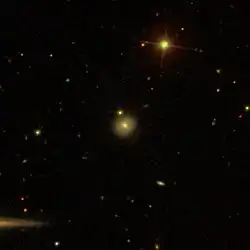| NGC 321 | |
|---|---|
 SDSS image of NGC 321 | |
| Observation data (J2000 epoch) | |
| Constellation | Cetus |
| Right ascension | 00h 57m 39.23461s[1] |
| Declination | −05° 05′ 10.1616″[1] |
| Redshift | 0.01616[2] |
| Heliocentric radial velocity | 4806 km/s[2] |
| Apparent magnitude (B) | 16[2] |
| Characteristics | |
| Type | E[3] |
| Other designations | |
| MCG -01-03-043, PGC 3443[2] | |
NGC 321 is an elliptical galaxy[3] located in the constellation Cetus. It was discovered on September 27, 1864, by the astronomer Albert Marth.[4] Measurements of its redshift put it at a distance of about 217.4 ± 15.4 megalight-years (66.67 ± 4.73 Mpc), assuming a Hubble constant of H0 = 67.8 km/sec/Mpc.[5]
It was the location of the planet Eminiar VII in the original series Star Trek episode "A Taste of Armageddon" (where it was incorrectly identified as a star cluster).
References
- 1 2 Brown, A. G. A.; et al. (Gaia collaboration) (August 2018). "Gaia Data Release 2: Summary of the contents and survey properties". Astronomy & Astrophysics. 616. A1. arXiv:1804.09365. Bibcode:2018A&A...616A...1G. doi:10.1051/0004-6361/201833051.
- 1 2 3 4 "NGC 321". SIMBAD. Centre de données astronomiques de Strasbourg. Retrieved 2021-02-02.
- 1 2 "Search specification: NGC 321". HyperLeda. Université Claude Bernard Lyon 1. Retrieved 2021-02-02.
- ↑ Seligman, Courtney. "New General Catalogue objects: NGC 300 - 349". cseligman.com. Retrieved 2021-02-02.
- ↑ "Results for object NGC 0321 (NGC 321)". NASA/IPAC Extragalactic Database. California Institute of Technology. Retrieved 2021-02-02.
External links
 Media related to NGC 321 at Wikimedia Commons
Media related to NGC 321 at Wikimedia Commons
This article is issued from Wikipedia. The text is licensed under Creative Commons - Attribution - Sharealike. Additional terms may apply for the media files.